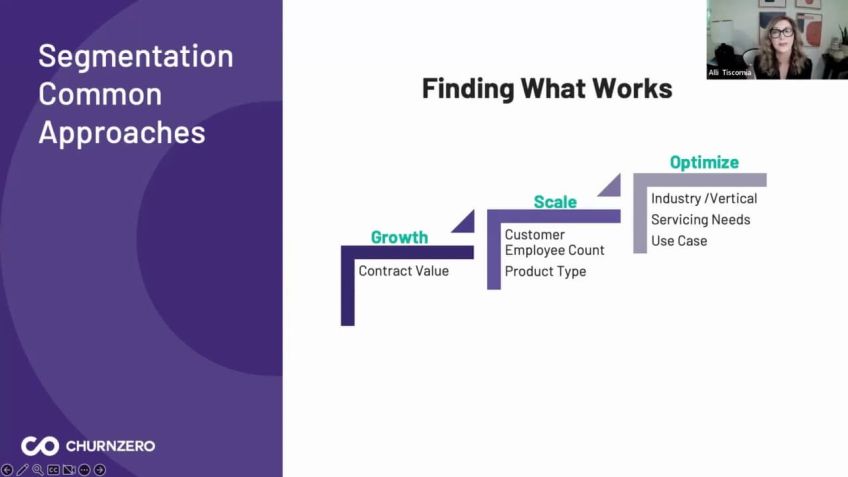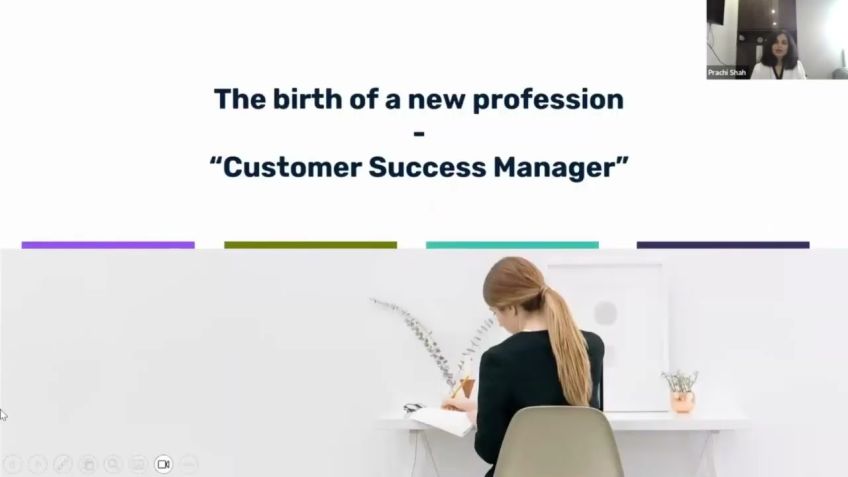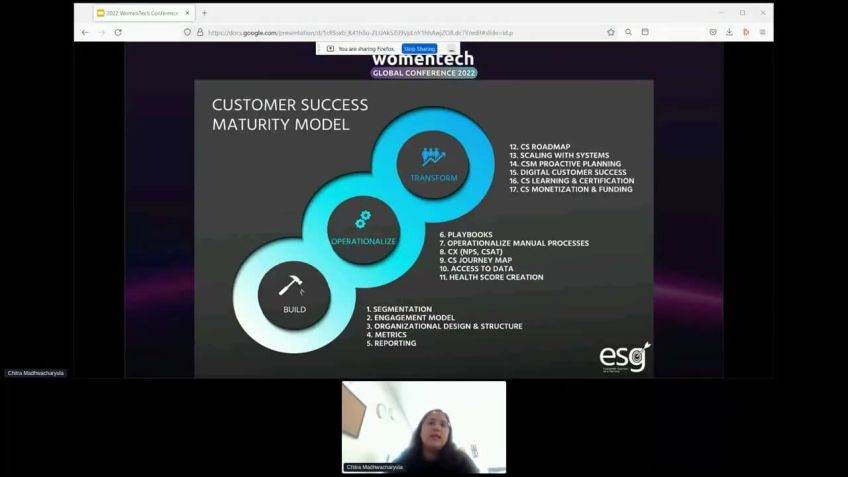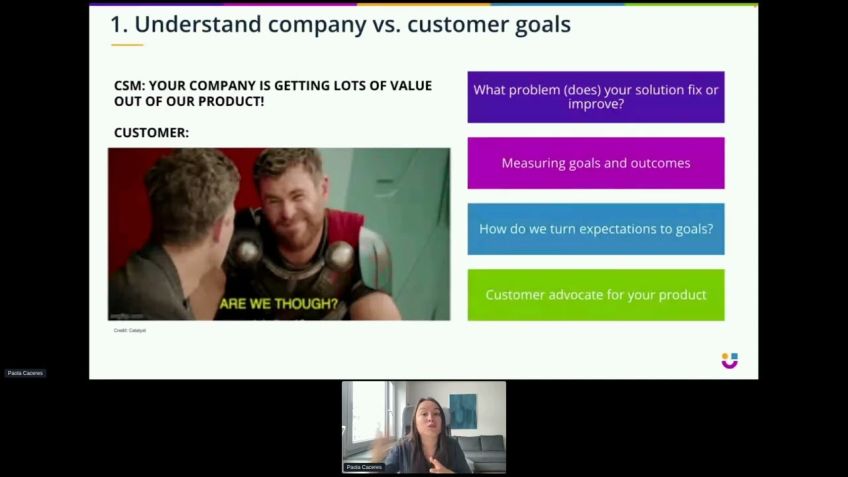PAOLA CÁCERES How to Start a Career in Tech through Customer Success
Exploring a Career in Customer Success Management
Are you considering a career path as a Customer Success Manager? In this blog post, my colleague Jacqueline and I, Paula, share some of the most important topics and questions around a career in Customer Success management. We discuss both our journeys into this field and why we believe this career path is incredibly rewarding.
Why Consider a Career in Customer Success
You might be wondering what a movie like "Spirited Away" has to do with Customer Success management. An open mind will connect the dots. Just as Chihiro, the main character in the movie, helps characters on their journey to their destination, so too does a Customer Success Manager help clients on their journey to achieve their outcomes with a company's solution or product.
Skills Required for a Customer Success Manager
Being a successful Customer Success Manager requires a specific skill-set.
- Communication: Ability to articulate points clearly.
- Relationship building: Fosters strong relationships with customers based on trust.
- Empathy: Understands and responds to the emotional state of the customer.
- Problem-solving: Identifies root problems and comes up with viable solutions.
- Analytical skills: Interprets complex data to inform decision-making processes.
- Project management: Oversees a project to ensure it is completed in a timely manner and within budget.
- Training and presentation: Effectively presents data and trains users on software or systems.
- Research mindset: Pursues an in-depth understanding of the customer's needs and wants.
Customer Success vs. Customer Service
There's often confusion between Customer Success and Customer Service. While both roles interact with the customer, Customer Service interactions are usually reactive whereas a Customer Success Manager's are proactive. Customer Service agents solve immediate customer issues while a Customer Success Manager ensures the customer's long-term success with a product or service.
Key Metrics for a Customer Success Manager
As a Customer Success Manager, gauging the health of your accounts is a key metric. This health check might involve utilizing the Net Promoter Score (NPS), a management tool that gauges the loyalty of a company's customer relationships.
Job Hunting in the Customer Success Field
When pursuing a career in Customer Success, consider your interests and passions. Software exists in every industry, giving you the freedom to work in a field you genuinely care about. Ask about the product's complexity during an interview. The easier a product is to use, the more you can focus on classic Customer Success responsibilities.
If you are considering an opportunity in Customer Success, please feel free to connect with Jacqueline or me via LinkedIn or email. We hope this post encourages and enlightens you to explore this career path further.
Video Transcription
Um let's get started. So this is going to be a fireside chat session with, together with my colleague, Jacqueline and we will cover some of the most important topics or questions around the customer success career path. For the first part, we will introduce ourselves.And for the second, we will jump right into the Qnaq and a session and we will have some time for your questions as well. So my name is Paula. I am from Colombia now based in Munich, Germany. And I wanted to share this amazing picture. One of my personal stories around this movie is Spirited Away and this is one of my favorite favorite animated movies. And this is when I did my first cosplay and this is what if you, in case you haven't watched it. Uh This is the story about the adventures of a young girl named Chihiro as she wanders into the world of the gods and spirits motivated just by one purpose, risking her parents. So you might be wondering what the spirit way has to do with customer success management. So one of the life lessons to learn from this movie is to help others on their journey to the destination. And this is one of the many goals that we as a customer success managers are we focusing on? So to ensure they achieve the outcome through our interactions, through interactions with the customers for um with our solution or product and how they achieve it or how, how they require outcome or appropriate appropriate experience of them.
So actually, Chihiro means in Japanese um asking questions, searching and seeking and that's pretty much what uh represents what I've been doing during my professional career. And what I'm gonna do today in this session. And I have worked in the field of research, management, marketing, and project management for several years in Colombia and in Germany. And this always searching for new challenges and this is why I call college hero. And then I found this amazing opportunity at ya uh working as a customer success manager. And yeah, I really looking forward to, to sharing these thoughts about this career path with you.
Perfect. So yes, my name is Jacqueline and uh the fun fact that I'm going to share with you guys today is what I actually did during um lockdown in order to cope. And uh what that was was a virtual hike of the Appalachian trail. I am originally from the States and um as Paula mentioned earlier, we are in Munich. So I did a bunch of local hikes uh in the area and um all of those miles or kilometers went towards uh my virtual hike and I was able to receive uh basically my first medal in life ever. So uh that's, that was a recent achievement for me. And um as far as my journey to customer success, I originally studied industrial engineering in school, but um upon completing an internship in a manufacturing setting, um I decided when I graduated that I wanted to try the other side of the coin with engineering, which is typically going into consulting and that consulting uh role actually was rebranded later to being customer success manager.
So uh as that term became more popular, we realized that's, that's really what we were doing. And I've been in customer success now for about seven years. So I'm looking forward to answering uh Paula's questions today.
Great. Thank you, Jacqueline. So, one of the most important questions when talking about customer success is what is customer success and why is so in demand?
Yes, I'll start with why it's in demand actually a bit of the history. So uh customer success came a bit with the rise of software as a service and the need for a subscription based model um for for contracts with customers. Um In the past, they may have purchased the software and actually had that software for life. But now with cloud based services, uh it's more common for it to be that they purchase on a subscription basis. And uh what that means is maybe they have a year long contract. And by the end of the year, they're actually able to choose to continue with that software and renew or choose not to and discontinue that contract. And so that kind of enters the need for customer success because our role is to actually build a relationship with that customer, um and fully understand what their goals are, what they're trying to achieve with the software. And then um our goal would be that we're able to work with them and uh help them achieve those goals. So that year to year they are still receiving value and want to renew.
Great. Thank you, Jacqueline. Yes. As I said before, customer success is about to be the customer's advisor throughout the journey to be the voice of the customer or customer advocates. So we are really working closely with the customer in understanding what are the drivers and understanding what success means for the customer and how the customer can succeed with our solution. This is one of the main um keywords around customer success. We have here renewal training relationship because this, we are building a long term relationship with the customer. Um We have here goals uh value, they have to find value with our solution as well. And the second, yeah, in relation to the first one, what are the skills, uh what type of skills are needed to work in customer success?
Yes. So in the next slide, we actually have a bit of a visual. So we have a list of skills that are very common. And uh just with the top three, we have communication, relationship building and empathy. And on the right, actually have a little bit of a um a diagram here uh that will further explain those a bit. So starting with listening, it's very important that we're able to um listen well to what the customer needs and also show them that we've understood what they want. Um So being able to show and prove that you are listening and understanding what it is that they need will build that trust. And then once that trust has been developed in that relationship, they will then trust you to guide them on best practices. So then you become a consultant, someone who is going to be their advisor and it actually does come full circle because now they're actually listening to you and seeking your advice because uh that that trust is there and uh they want your guidance
great. And yeah, as you said, Jacqueline, we have to focus not only on the outcome but also on the experience for our customers as a trustee advisor, we have to show them empathy, maybe they are feeling frustrated with our solution. And therefore we need to be a good listener as well. It's really important to have this skill.
Exactly. And then of course, there's also other skills um such as problem solving, analytical skills. It's very important to have these because you need to be the product expert for them. They uh may come to you with a problem and they're not sure how to solve it within um your platform. And it's very important that you're able to, to take what they're trying to do and come up with a solution and um advise them in the right direction. Project management can also be important after they sign that contract. And um you actually start the relationship with them on the customer success side. Uh You're probably going to be working with them on the initial implementation, that's going to require some project management skills, uh working with the all the stakeholders, making sure everyone's goals are being met and then training and presentation kind of goes along with that as well.
There will be initial training so that they're able to learn how to use the platform and able to configure the software to meet their needs. Um So having good training skills such as um knowing when to bring up uh examples that really relates to them um is really important uh to drive points home. Uh The last one, research mindset I think is something that's, that's not often thought about, but it's really important and it can actually set someone um apart from just being a customer success manager, it's being a really good one. And um some examples when that might come up could be in the kickoff call. Um That's usually the first interaction you might have with a customer to start up that relationship. Um It's very important to ask a lot of questions in that call to find out why have they purchased the software? What are they trying to achieve? What are their goals? And also another really important thing to ask, how do they plan to measure the success of the solution? How are they going to identify if, if um it's meeting their needs?
Um And actually quantify that it's important for you to know that because then you're able to guide them in the right direction with that knowledge. Another example of when you might use the research mindset is maybe they come to you saying, hey, we need this feature. It's really important to ask, why do you need that? What are you trying to do? It's possible that another feature exists within your platform that actually does meet their needs that they weren't aware of. Um And they had just had a different vision in mind and then you're able to point them in that direction or maybe there is no uh nothing that can address their needs, but through asking more questions and finding out a bit more about what they're trying to accomplish, you can then relay that information internally to your product team so that they can map out the appropriate parameters for that feature.
Great. Um For the third one, maybe there are some misconceptions between the customer service and the customer success manager positions, even though we were, we were really close together, but maybe we interact in, in a different way with the customer. So what is the difference between these, these positions?
Yes. Very good question. So customer success, I feel like whenever people think of that they jump to customer support and there actually are some major differences on the next slide, we actually have a few that are mapped out. The main one is that customer support, their interactions with the customers are typically more reactive. Um And for us, it's more proactive. So with customer support, it could be that um somebody reaches out with, with a problem or question about the product. And uh really customer support doesn't have time to, to build a relationship with them. They really just need to focus on making sure that that interaction they have with them is as pleasant and um can solve their problem by the end of it as it can be. And um really the goal is that the customer is able to leave that interaction with a solution or at the very least they're satisfied with the end result. And customer success, like I mentioned, it's usually more proactive. Uh we have milestones throughout the implementation that, that we want to hit. We also have um business reviews uh typically that will be on a regular cadence such as quarterly and all of these touch points. Are really mapped out, you have time to build this relationship and really be a consultant for those customers.
Perfect um for the fourth one. So yesterday, we have joined this amazing session from y'all about using data to elevate customer experience. And she mentioned something more important. Customer is the king, customer is king and data is the key to the kingdom. So data help us to be well informed. So this is directly related to this question. So what are the key metrics you need to deliver to be successful in this position?
Yes. So typically, uh the way that you measure how successful you're being is you try to gauge the health of your accounts and obviously the more healthy the account, the more likely they are to renew or even expand. Um So that's, that's really your end goal. That's a good way to look at how you're doing one way of doing that. Um Or at least the way to quickly capture some information is via the NPS score. Um This is done via a one question survey. The question being on a scale of 0 to 10. How likely are you to recommend the software to a friend or colleague? Um And here you'll have uh essentially they'll be able to click on any of these numbers from 0 to 10. They'll be acknowledged as a detractor, passive or promoter um kind of in the background and then um the health of score will be calculated based on the percent of promoters and then subtracting the percent of detractors that will give you the net promoter score. This is on a scale of negative 100 to positive 100. Um with negative 100 being the lowest, positive 100 being the highest. And ideally you want to be in the positive area, um the higher you are the better. Um this is of course just going to be a quick snapshot. It's, it, it gives you a good pulse on, on how everything's doing, but it's really just a piece of it.
It's really important to still have regular touch points such as those business reviews where you're actually having some interaction, asking some questions, getting some qualitative feedback in addition to um having this quick pulse um quick response from them as well.
Awesome um For the next ones, if you want to pursue a new career challenge or if you're looking for a job in the field, so what to look for in a customer success positions?
Yes. Yes. So I would say that there's two main things that you should be thinking about when you're looking at roles. Um One would be what industry are you interested in? Because software exists in every industry. That's, that's kind of the beauty of software and the beauty of customer success is it's needed everywhere. So that gives you some freedom to think about. Where do your passions lie. So, for example, maybe you come from a family of teachers and you're really passionate about education.
There are plenty of platforms out there that are um used by teachers. Their, their whole goal is to make the teacher's life a bit easier. Um And so it could be that you might apply for roles uh at some of those. Um Another example could be you're very interested in um the environment and there's plenty of software within the renewable um energy uh field. So it just really focus on your passions and apply to those. Uh Because I think uh that's where you're going to find the most happiness and those types of roles where you feel you're making an impact in something that you're really interested in. And then the other thing to think about and maybe even ask in an interview. Um If you have an interview for a customer success position is what is the product like? And how, how complex is it? Are, would you be expected to do a lot of the configuration on behalf of the customer or is it something that has a really good ease of use? And the customer is able to after some training, do a lot of it on their own and, and do their own configuration. It's really important to um to target some roles where the product has really good ease of use.
And then that way you're able to focus your attention more on the, the classic CS responsibilities um such as, you know, big strategic discussions, um planning out uh the how to achieve goals and uh thinking about renewals, planning for those business reviews, things of that nature, really, the more proactive things
great. And this relates to the last question. So how is customer success at USA?
Yes. So um first we'll start off with what user lane is a bit. So, User Lane is the fastest way to provide help in any software user la can guide and support users directly in any web-based application and instantly make any software process easy to grasp. So our customers will actually uh use User Lane to build out guides within their applications that their users are then able to use interactively uh to learn that application or even just complete tasks within the application. Um So as far as how that impacts us on the CS team, the product User Lane is very easy to learn and it's easy to uh build these guides from start to finish all on their own. The these customers are able to do a lot of it themselves. Um So like I said earlier, there's a lot of benefits with that that makes our lives a bit easier and allows us to focus on the more typical CS responsibilities. Another big aspect of User Lane um is our organization, how we're structured on the CS Department. It's important to note that we are not just a team of customer success managers. We also have two other uh categories. One being implementation consultants and the other being a team of customer support agents. These are very important. Um because for example, with the implementation consultant, uh they are more of the technical resource, they, they're around typically for the implementation and um they're able to help out a lot with uh with training and anything that could come up.
Um As a technical roadblock and then customer support agents, we've mentioned a bit about what customer support does. But um as far as how they help us with our role, it's possible that maybe um a question comes to us from the customer, we try to solve it, maybe we're not able to help them out, we're able to push it to customer support and they are product experts who can address it. So that's another aspect of USA that's uh really helps out myself. And Paula is that we have a really strong implementation and customer support team.
Yeah, as a customer success man, and I'm really focusing on the on boarding process, as we mentioned before with the customer, until the go live. And after the goal life, we are having this business review. So this interactions throughout the solution with um with our product.
Um Yeah, I think if you have questions, we have one minute left. So thank you so much for joining us, for joining us today and feel free to connect with us via, via linkedin or email. And thank you so much if I see questions in the chat. And so,
yeah, yeah, great question is a technical background essential for this position. No, it is not. Um Like I mentioned, uh there's at least in our case, teams of implementation consultants and a team of support agents. Uh and really they help out in that technical way, you know, they, they can address a lot of technical issues, leaving us to focus more on big strategy. And this is not uncommon to have these types of um organizations within the CS department, other uh companies have this as well. Um So yeah, so technical background is not essential for the position.
Great. So, and we have a last one. What's user links, web link for, for positions. So feel free to connect with us. We can provide you the link for the PIC. Thank you so much for joining us and happy to connect with you.





